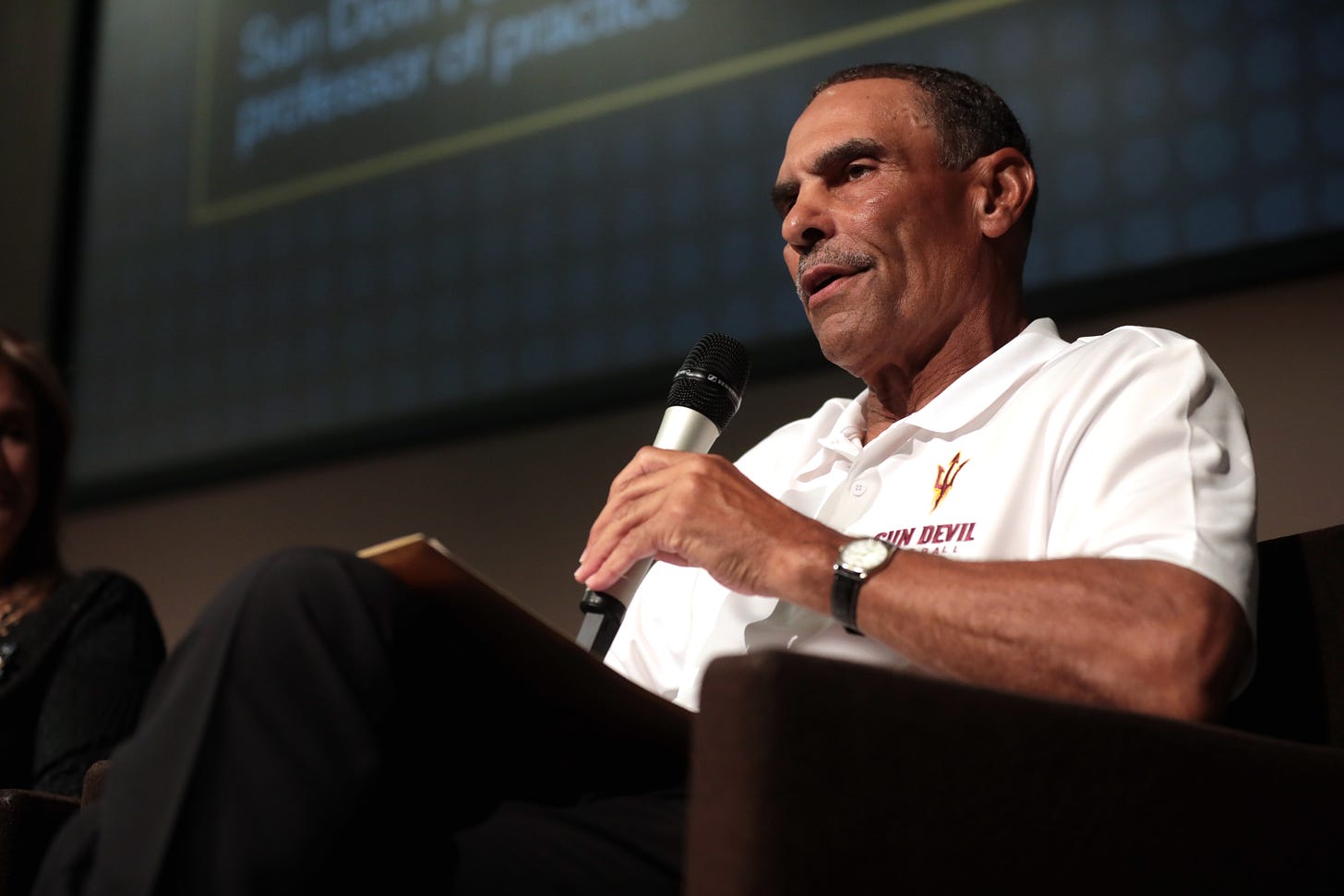NCAA hands down partial punishments to Arizona State Football
How the NCAA sanctions affect the Sun Devils in 2024 and onward

The NCAA Committee on Infractions released its latest round of punishment on April 19, this time handing down a round of sanctions against Arizona State University for recruiting violations under former head coach Herm Edwards. The case is not finished, as two individuals named in the Notice of Allegations are appealing the decision. The full report from the Committee on Infractions will be released once the case is completed.
To be clear, this is a case that we knew was coming. Edwards was fired in part for his role in these allegations and in part to a bad loss to Eastern Michigan, of all teams. The NCAA was already breathing down Arizona State’s neck, so it was clear that moving on from their embattled and floundering head coach was the best path forward.
That’s part of why the Arizona State job was so unappealing. The looming NCAA investigation made many experienced candidates turn away. Still, they landed a solid offensive mind in alumnus Kenny Dillingham, who put together a pretty solid first season considering their inability to keep any quarterbacks healthy and the pending investigation.
The crimes
Now, let’s get into what the previous regime is accused of. According to the NCAA Committee on Infractions, this punishment is based on:
In-person recruiting contacts with prospects during the COVID-19 dead period (i.e. hosting recruit visits)
Recruiting inducements
Impermissible tryouts
Tampering
Essentially, we can boil down the charges against the Sun Devils into one category: recruiting violations.
Even though the previous regime which these allegations come from has been dismissed, the program still gets punishment. Whether or not we think that’s fair is beside the point. The NCAA makes that decision.
So, what did the NCAA decide is a worthy punishment for these crimes? In a partial ruling, the Committee on Infractions slammed the following punishments on the Sun Devils:
Four years of probation
A fine
Vacating 9 of its 10 wins from 2021-22 for the use of ineligible players
Scholarship reductions
Recruiting restrictions
Additionally, in the settlement between the program, involved individuals, and the Committee on Infractions, Arizona State’s self-imposed 2023 bowl ban is lumped into the punishment. Sure, they went 3-9 and didn’t sniff the postseason, but a self-imposed ban goes a long way for the NCAA. They like to see that a program understands that what they did was wrong. Showing Edwards the door and imposing a bowl ban proves Arizona State administration were taking the allegations seriously.
Additionally, the NCAA dropped the hammer on the staffers involved. Former head coach Edwards received one of the longest show-cause bans in NCAA history with a five-year ban. Six other former Arizona State staffers were handed show-cause penalties ranging from three to 10 years.
Finally, the university agreed to disassociate with NFL prospect Jayden Daniels’ mother, Regina Jackson. She is alleged to have facilitated the illegal contact during the COVID-18 dead period by purchasing flights and hotel rooms for visiting prospects.
It’s also important to note that two of the charged coaches are contesting their cases, so there is a potential for more punishment, including Las Vegas Raiders head coach Antonio Pierce. I’d expect any remaining punishment to come in the form of show-cause penalties similar to Edwards and other staffers.
What exactly do these punishments mean?
Arizona State got hit with a ton of penalties, so let’s go through them one-by-one.
First, the program sits in four years of probation. As we discussed in the Michigan case, probation is essentially having the NCAA watch over a program for the duration of the penalty. This can include having NCAA compliance officers on campus and in the program, as well as requiring consistent reports from the school’s compliance office. Any violations discovered during this probationary period can trigger the repeat violator clause, better known as the “death penalty,” so probation often works to tighten up the ship.
The fine amount was not released, but most fines for this level of recruiting violations come in excess of $5,000. While that’s not a massive sum, it is enough to make the books uncomfortable for a program. Football, however, is almost always the most profitable sport, so a $5,000 fine shouldn’t ruffle too many feathers.
For the scholarship and recruitment restrictions, those details have not been made clear. What is clear, though, is any penalties based solely on recruiting will severely hamper Dillingham’s ability to succeed on the trail.
According to the Phoenix Business Journal, Arizona State was second-to-last in the PAC-12 in recruitment spending for men’s sports at $1.35 million. If they want to keep pace in the Big 12, and Power Four as a whole, any recruiting restrictions will make that incredibly difficult. While Dillingham was able to pull Jaden Rashada, the sophomore has entered the portal already.
As for the show-cause penalties, those are simple: the coaches cannot be associated with the NCAA for the duration of the penalty. The disassociation with Regina Jackson, Jayden Daniels’ mother, is permanent, and she cannot serve as a booster or be associated with the schools’ athletic department at all.
It seems like Michigan got off light
It does on the surface, especially with the NCAA applauding the cooperation with the investigation by Arizona State and Harbaugh fighting the NCAA tooth and nail each step of the process.
In reality, the violations are just different. Sure, they’re similar on the surface: COVID dead period recruiting restrictions and illegal tryouts. But that’s where Michigan ends. Arizona State took it a step further.
Michigan didn’t use a booster to book illegal trips for recruits so it wasn’t tied to the athletic department. Arizona State did. Michigan didn’t use illegal players across two seasons. Arizona State did. Michigan didn’t tamper with other schools’ players flirting with the portal - or at least didn’t get caught. Arizona State did.
While it’s fun to compare the two circumstances, especially considering the main charges and the timing of the sanctions, it’s apples to oranges. Yes, they’re similar, but they’re not similar in the level of violation. Harbaugh didn’t run a clean program, that much is clear. Edwards, on the other hand, encouraged and engaged in a dirty program that took steps to hide their transgressions.
That’s why Michigan got less punishment by the NCAA. Not because they’re a golden child and reigning national champion. Because they simply didn’t go as far as Arizona State did.
Does this affect the Sun Devils in 2024?
While Michigan is likely getting off unscathed, Arizona State will not. This is going to affect the program for the immediate future, not just 2024.
Already, the quarterback of the future (Rashada) and top wideout (Elijhah Badger) are in the portal. More players could enter the portal, especially with the spring window wide open.
On top of that is the recruiting restrictions as the Sun Devils transition to a new conference. The Big 12 looks to be very competitive, and Arizona State already doesn’t factor into the conversation. How long does it take Dillingham to build a program in the desert? And how vast are these recruiting restritions and loss of scholarships? Once we include the tampering charge, we can also assume that Arizona State’s portal practices will also be subject to the watchful eye of the NCAA probation officers.
In all honesty, I’m worried for Arizona State. We knew that punishment from the NCAA was coming, but didn’t expect it to get this bad. Dillingham and his staff have to really turn on the recruiting skills to salvage what looks like a no-win situation.
Have any questions, ideas, article pitches, or information? With the new Substack features, you can directly message me! Hit the button below to send me a message, or reach out via email to sidsports23@gmail.com, or find us on your favorite social media platform like Facebook, Instagram, Twitter, Substack Notes and Bluesky.





